Throwback Thursday: Clyde Lovellette
Feb. 9, 2012
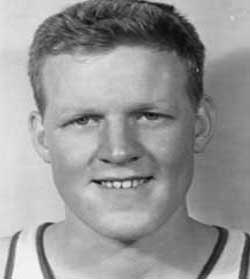 Clyde Lovellette (Men’s Basketball) 1949-52
Clyde Lovellette (Men’s Basketball) 1949-52
The Petersburg, Ind. native is simply one of the best to ever don the KU uniform. In just three seasons, “Cumulus Clyde” compiled 1,979 points (third all-time), and led Kansas to an NCAA title in 1952.He would also win a gold medal playing for KU Coach Phog Allen in the Olympics later that year. After his collegiate and Olympic experience, Lovellette would go onto star in the NBA for11 seasons with four different teams, where he won three championships.After basketball, he would try his hand at a number of different professions, including politics, broadcasting, coaching, farming and sales. He now lives in an Indianapolis suburb, with his wife Judy. Lovellette was enshrined in the basketball hall of fame in 1988.
It’s been nearly 60 years since you and your teammates won KU’s first NCAA Championship. Is it hard to believe it’s been that long?
“Gosh no! You think in your mind it hasn’t been that long because I still think I can play basketball. I am 82 now and it is just amazing to think that we have that many guys that are still here.”
You grew up in Indiana, so how did a Hoosier end up in Kansas?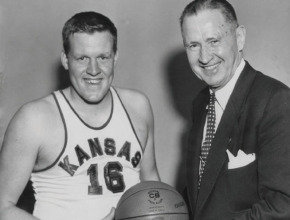
“Most kids around Indiana that have any ambition of going onto college and playing sports would go to Indiana, Purdue, Notre Dame, Ball State or Indiana State. I had no ambition to go anywhere other than Indiana because all of my coaches were from Indiana. That was until Dick harp came through one time and just stopped by to say hello. He talked to me about Kansas and then Phog came over, who was very persuasive, so I stopped thinking about Indiana and thought about Phog and his plans for us. He told me we would win the national championship in ’52 and we would also go to the Olympics and win the gold medal. I thought that was really great, because no one had ever talked to me about those possibilities, so I wanted to be a part of that.”
What was it like playing for the legendary Phog Allen?
“Doc was a great individual. He was a great psychologist and was a great motivator in his own way. Dick harp was very tactical and those two guys working together were super. Phog said what he thought and he was very vocal in what he believed. He conveyed that to us and the press and I liked a man who was like that and stood up for what he believed in.”
Do you remember your first game as a Jayhawk?
“Back in those days you could not play as a freshman, so that first year was spent as a scrub against the varsity, trying to get them better to win. Once you got into your sophomore year, you were playing for something. That was a little daunting, the first time you walked on the court. Of course it would have been more so if we played in Allen Fieldhouse, but at the time we played at Hoch Auditorium, which was a little different. That’s because we had a stage on one side (of the court) and the audience on the other. I remember running across from Robinson Gymnasium to Hoch so we could play, because there were no dressing rooms (in Hoch).”
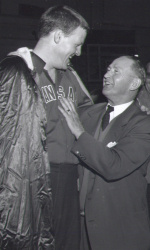 You are fourth on the all-time scoring list at KU with 1,979 points in just 80 games played… the other three in front of you average about 140 games during their career. What does that say about your scoring abilities?
You are fourth on the all-time scoring list at KU with 1,979 points in just 80 games played… the other three in front of you average about 140 games during their career. What does that say about your scoring abilities?
“You just have to remember that I did it in three years and they had four years to do it. It bothered me sometimes, because if you think of three years compared to four years, then I would be number one. Those things do not mean that much to me because we had 80 great games together and I enjoyed playing for KU.”
You are one of very few Jayhawks who have won a national championship as well as an Olympic Gold medal. What was that experience like during the summer of 1952 in Finland?
“Phog said when he was coming to recruit me that we were going to accomplish that in 1952. I did not know much about religion at that time, but I knew prophets could predict what was going to happen, so apparently he was one of those! Our gold medal that we won in Helsinki was a great accomplishment because that’s what Phog set out to do. It was one of the best times of my life because I never thought that I would go to the Olympics as a kid growing up. I had a chance to do that with seven of that Kansas group from ’52 and if you go back, I was actually the first ball player that won a national championship (1952 with KU), gold medal (1952 USA) and NBA championship (1954 Lakers).”
You played in the NBA during its infancy… what was the league like back then?
“In the NBA (back then), we only had eight teams, four in the East and four in the West. We were the pioneers because we rode busses and trains together with other teams all over the country to try to make the NBA what it is today. I think it is really neat to think that you are a pioneer in a sport that is so popular now. We did not have television, but we had radio and newspapers, nothing like the exposure that these guys have today. I honestly believe that the guys who played in our era had greater times and more companionship than those who play today, simply because there is so much money and more prestige. We played for very little money, but if you would compare us to the players today, we had better talent. A lot of guys that are playing in the NBA today could not make our squads back in the old days.”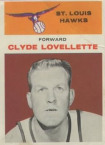
Bill Russell was your teammate when you were with the Boston Celtics (1962-64), what was it like playing alongside the greatest champion the game has ever known?
“It was great to sit there and watch him, because at that time my career was in the twilight. I wasn’t a starter at that time, so to sit and watch him play and then go in and relieve him every once in a while was great. Playing against him for about ten years was even more a challenge. He was quick and he could jump, he was an all around player that you would want. The only time the Celtics were really noticed was when Russell came in to Boston. They were a good ballclub before, but he just solidified that team because he could play defense tremendously, rebound tremendously and could score adequately. He was a tremendous presence in the game.”
Who was your favorite teammate, whether in college or the pros?
“Where I had the best time was at Kansas, with the 1952 team. When you are in college, you never think about leaving Kansas and going into the pros. We never thought about anything except playing at KU for four years, so loyalty was I think the best in that time. You had to wait until your graduating class before you were eligible to go into the pros, so we had togetherness more so than I did in the pros. Now the pro teams I was with, the best time I had was with St. Louis (1958-62), with Bob Petit, Cliff Hagan, Slater Martin and Lenny Wilkins. Those groups of guys were always together, barbequing, spending family time with one another, but after that it started to become more of a business, when Russell, Chamberlain and the big money players started coming into the league.”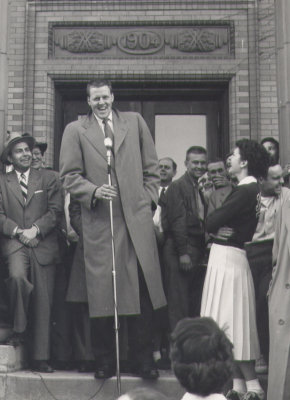
Who did you look up to in the game of basketball growing up?
“If you came back to 1947 or ’48, there was no TV, just radio, so the only time you heard about someone outside of Indiana was in the newspaper. We never heard about basketball outside of Indiana, so my hero was not in basketball, but instead it was Joe Louis (in boxing). I used to listen to him all the time fight on the radio, so he was the one that I thought was great. He was my hero but I never knew anything about him except for what I read. I had no basketball heroes except for those I saw play at Indiana, Norte Dame, Purdue and those places.”
How would your 1952 team fare in a round robin tournament between your ’52 team, Larry Brown’s 1988 Jayhawks and Bill Self’s 2008 crew?
“First of all you would have to put us in the same year with the same resources because the training that went into 1988 compared with ’52 was so different. I’m talking about the dietary aspect and the weights because the only thing we trained with was just natural ability. We never got into weights to build our muscles up. We ran, and stayed away from weights because Phog always felt that you don’t want to build up your muscles because you won’t have that flexibility with your arms so that you can shoot the ball. All you have to do is look at the size of the players today and then look at our ’52 team; we were sort of on the skinny side, even though I weighed 245 pounds when I played. So, if you put us in the same era, with the trainers that work these guys out now, we could hold our own.”
What did you do once your professional career was over?
“I was one who never worried about how I was going to make a living. I didn’t worry about being in the spotlight anymore because I had done my thing. So when I came back (to Indiana), I worked at a radio station and a TV station in Terre Haute, where I broadcasted some games for Indiana State as well as some high school games. I also sold TV time, but then I got a bug that made me want to go into politics, so I ran for Sheriff of Vigo County (Terre Haute), and I did my Sheriff’s duty for my term in office. After that, it was back to the radio station and once I was done there, I was in the car business for a while, but was also into farming and ranching. Then I went up to the east coast, where my wife (Judy) had a gift shop and antique business. I coached one year at a Catholic high school up there, and I met the lord when I was in Cape Cod. Shortly after that I had an offer to come back to White’s Institute (Wabash County, Ind.) to coach and to teach, so I spent 20 years there. Now I live in North Manchester, which is a little farming community in North East Indiana.”
What will you enjoy most about this weekend’s reunion?
“My greatest thrill when I come back to Kansas is sitting down with the 1952 team. I love going to the games and watching KU play, don’t get me wrong, but to see the guys and reminisce about what we accomplished in four years is what I will be enjoying the most. I will take a lot of that back home to Indiana and think about it for quite a while.”
“I also love the fans, because I don’t think there is another school in the country that has as much tradition and loyal fans as KU does. The atmosphere and the people in town when I was there was the biggest reason for the love that I have for Kansas.” 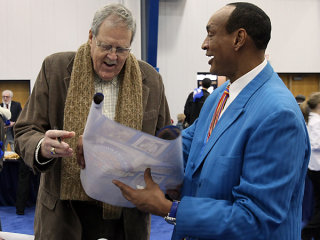
Throwback Thursday Archive Page: http://www.kuathletics.com/throwbackthursday.html

